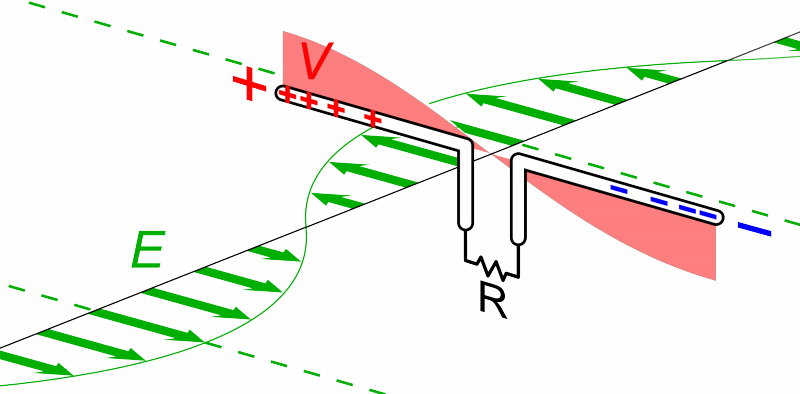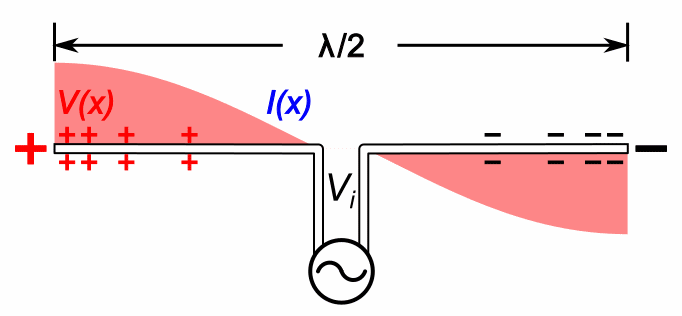Dipole antenna Updated 2025-07-16
Radio Wave Properties: Electric and Magnetic Dipole Antennae by Harvard Natural Sciences Lecture Demonstrations (2020)
Source. The dude lights bulbs on an antenna made of a single piece of copper, powered with EM radiation. Amazing. Dirac equation vs quantum electrodynamics Updated 2025-07-16
TODO: in high level terms, why is QED more general than just solving the Dirac equation, and therefore explaining quantum electrodynamics experiments?
Also, is it just a bunch of differential equation (like the Dirac equation itself), or does it have some other more complicated mathematical formulation, as seems to be the case? Why do we need something more complicated than
The main high level insight seems to be that The Dirac equation does not work for more than one electron.
Bibliography:
- physics.stackexchange.com/questions/101307/dirac-equation-in-qft-vs-relativistic-qm
- physics.stackexchange.com/questions/44188/what-is-the-relativistic-particle-in-a-box/44309#44309 says:
- physics.stackexchange.com/questions/64206/why-is-the-dirac-equation-not-used-for-calculations
- www.physicsforums.com/threads/is-diracs-equation-still-useful-after-qed-is-developed.663994/
Dirac Lagrangian Updated 2025-07-16
where:
Remember that is a 4-vetor, gamma matrices are 4x4 matrices, so the whole thing comes down to a dot product of two 4-vectors, with a modified by matrix multiplication/derivatives, and the result is a scalar, as expected for a Lagrangian.
Like any other Lagrangian, you can then recover the Dirac equation, which is the corresponding equations of motion, by applying the Euler-Lagrange equation to the Lagrangian.
Directional derivative Updated 2025-07-16
Dirichlet boundary condition Updated 2025-07-16
Specifies fixed values.
Can be used for elliptic partial differential equations and parabolic partial differential equations.
Numerical examples:
Discord email notifications Updated 2025-07-16
Discord is useless if you want to participate in more than one large group because of this. It is impossible to get email notification for selected threads you care about.
No way to get email notifications for missed activity? support.discord.com/hc/en-us/community/posts/360041806392-Can-we-get-an-email-notification-option-for-messages-
Discrete Fourier transform of a real signal Updated 2025-07-16
See sections: "Example 1 - N even", "Example 2 - N odd" and "Representation in terms of sines and cosines" of www.statlect.com/matrix-algebra/discrete-Fourier-transform-of-a-real-signal
The transform still has complex numbers.
Summary:Therefore, we only need about half of to represent the signal, as the other half can be derived by conjugation.
- is real
"Representation in terms of sines and cosines" from www.statlect.com/matrix-algebra/discrete-Fourier-transform-of-a-real-signal then gives explicit formulas in terms of .
NumPy for example has "Real FFTs" for this: numpy.org/doc/1.24/reference/routines.fft.html#real-ffts
DFT of with 25 points
. Source at: numpy/fft_plot.py. This plot illustrates how the DFT of a real signal is symmetric around the middle point, and so only half of the transform points are needed to reconstruct the original signal. We also see how the phase of the sinusoids determines if their DFT components are real or imaginary. Disk encryption password handover plausible deniability Updated 2025-07-16
Can the last disk access times be checked via forensic methods?
Disk read-and-write head Updated 2025-07-16
Ciro Santilli's hardware 2023 laptop buy research Updated 2025-07-16
- Dell XPS 15 www.dell.com/en-uk/shop/laptops/12th-gen-intel/spd/xps-15-9520-laptop
- CPU: Intel Core i7-12700H (12th gen)
- Graphics: Nvidia GeForce RTX 3050 Ti
- RAM: 16GB DDR5. Can be upgrated to 32 or 64.
- Display: 15.6-inch 3.5K (3,456 x 2,160), 60Hz
- Storage: 1TB PCIe NVMe M.2 SSD. Can be upgraded to 2TB or 4TB.
- Weight: 1.96 kg
- Price in UK: £1,948.99
- Ubuntu: no
- Tom's guide battery life: 10-hours (web browsing) www.tomsguide.com/reviews/dell-xps-15-oled-2022-review-a-great-macbook-pro-alternative
- Dell XPS 13 www.dell.com/en-uk/shop/laptops/xps-13/spd/xps-13-9315-laptop
- Dell XPS 13 plus
- ThinkPad X1 Carbon Gen 11 (14" Intel) www.lenovo.com/gb/en/p/laptops/thinkpad/thinkpadx1/thinkpad-x1-carbon-gen-11-(14-inch-intel)/len101t0049
Distribution (mathematics) Updated 2025-07-16
Generalize function to allow adding some useful things which people wanted to be classical functions but which are not,
It therefore requires you to redefine and reprove all of calculus.
For this reason, most people are tempted to assume that all the hand wavy intuitive arguments undergrad teachers give are true and just move on with life. And they generally are.
One notable example where distributions pop up are the eigenvectors of the position operator in quantum mechanics, which are given by Dirac delta functions, which is most commonly rigorously defined in terms of distribution.
Distributions are also defined in a way that allows you to do calculus on them. Notably, you can define a derivative, and the derivative of the Heaviside step function is the Dirac delta function.
Divergence in Einstein notation Updated 2025-07-16
Don Lincoln Updated 2025-07-16
Publishes through the Fermilab YouTube channel under the playlist "Fermilab - Videos by Don Lincoln"
Some insights, but too much on the popular science side of things.
Do one thing and do it well Updated 2025-07-16
Is this exact sentence really from UNIX philosophy? en.wikipedia.org/wiki/Unix_philosophy#Do_One_Thing_and_Do_It_Well
Of course, it has precedents, e.g. jack of all trades, master of none
Do superconductors carry infinite current? Updated 2025-07-16
No, see: superconductor I-V curve.
Bibliography:
- physics.stackexchange.com/questions/62664/how-can-ohms-law-be-correct-if-superconductors-have-0-resistivity on Physics Stack Exchange
- physics.stackexchange.com/questions/69222/how-can-i-put-a-permanent-current-into-a-superconducting-loop
- www.quora.com/Do-superconductors-produce-infinite-current-I-V-R-R-0-How-do-they-fit-into-quantum-theory
- www.reddit.com/r/askscience/comments/dcgdf/does_superconductivity_imply_infinite_current/
- www.reddit.com/r/askscience/comments/7xhb46/what_would_happen_if_a_voltage_was_applied_to_a/
Double-slit experiment Updated 2025-07-16
Amazingly confirms the wave particle duality of quantum mechanics.
The effect is even more remarkable when done with individual particles such individual photons or electrons.
Richard Feynman liked to stress how this experiment can illustrate the core ideas of quantum mechanics. Notably, he night have created the infinitely many slits thought experiment which illustrates the path integral formulation.
Nested set model Updated 2025-07-16
This is particularly important in SQL: Nested set model in SQL, as it is an efficient way to transverse trees there, since querying parents every time would require multiple disk accesses.
The ASCII art visualizations from stackoverflow.com/questions/192220/what-is-the-most-efficient-elegant-way-to-parse-a-flat-table-into-a-tree/194031#194031 are worth reproducing.
As the sets:
__________________________________________________________________________
| Root 1 |
| ________________________________ ________________________________ |
| | Child 1.1 | | Child 1.2 | |
| | ___________ ___________ | | ___________ ___________ | |
| | | C 1.1.1 | | C 1.1.2 | | | | C 1.2.1 | | C 1.2.2 | | |
1 2 3___________4 5___________6 7 8 9___________10 11__________12 13 14
| |________________________________| |________________________________| |
|__________________________________________________________________________|Consider the following nested set:
0, 8, root
1, 7, mathematics
2, 3, geometry
3, 6, calculus
4, 5, derivative
5, 6, integral
6, 7, algebra
7, 8, physics Nested set model in SQL Updated 2025-07-16
How to implement Nested set model in SQL:
- stackoverflow.com/questions/192220/what-is-the-most-efficient-elegant-way-to-parse-a-flat-table-into-a-tree/42781302#42781302 contains the correct left/size representation and update queries, which makes it much easier to maintain the tree without having to worry about the sizes of siblings which are constant
- stackoverflow.com/questions/192220/what-is-the-most-efficient-elegant-way-to-parse-a-flat-table-into-a-tree/194031#194031 amazing ASCII art representations of the structure. Unfortunately uses a wonky left/right representation, rather than the much more natural left/size representation from the other post
There are unlisted articles, also show them or only show them.


